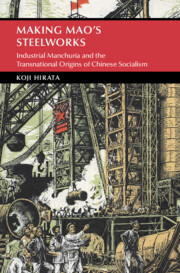Book contents
- Making Mao’s Steelworks
- Cambridge Studies in the History of the People’s Republic of China
- Making Mao’s Steelworks
- Copyright page
- Contents
- Figures
- Tables
- Preface
- Abbreviations
- Introduction
- Part I Empire, War, and the Global Crisis of Capitalism, 1915–1948
- 1 Blood, Iron, and the Japanese Empire
- 2 The Soviets and Nationalists Are Coming
- Part II Socialist Industrialization as a Hybrid System, 1948–1957
- Part III Socialisms with Chinese Characteristics, 1957–2000
- Conclusion
- Acknowledgments
- Appendix A Note on Primary Sources
- Bibliography
- Index
1 - Blood, Iron, and the Japanese Empire
from Part I - Empire, War, and the Global Crisis of Capitalism, 1915–1948
Published online by Cambridge University Press: 19 December 2024
- Making Mao’s Steelworks
- Cambridge Studies in the History of the People’s Republic of China
- Making Mao’s Steelworks
- Copyright page
- Contents
- Figures
- Tables
- Preface
- Abbreviations
- Introduction
- Part I Empire, War, and the Global Crisis of Capitalism, 1915–1948
- 1 Blood, Iron, and the Japanese Empire
- 2 The Soviets and Nationalists Are Coming
- Part II Socialist Industrialization as a Hybrid System, 1948–1957
- Part III Socialisms with Chinese Characteristics, 1957–2000
- Conclusion
- Acknowledgments
- Appendix A Note on Primary Sources
- Bibliography
- Index
Summary
This chapter explores the Japanese colonial origins of Angang between 1915 and 1945. The outbreak of World War I reconfigured the geopolitical balance in East Asia, enabling Japan to develop ironmaking in Anshan. World War I also led to the rise of the Soviet Union, prompting interest in economic planning among many outside Russia, including Japanese researchers in Manchuria. These new developments in the interwar years crystallized in state-directed industrialization in Northeast China under Japanese occupation from 1931 to 1945. Through Soviet-inspired economic policies, the Japanese-sponsored puppet regime of Manchukuo developed Shōwa Steelworks in Anshan to support Japan’s war and imperial expansion. Reflecting the quintessentially colonial nature of Manchukuo, Chinese workers faced various forms of violence and discrimination on a day-to-day basis, increasing the forced labor mobilization of Chinese prisoners of war. Through planning and violence, the Japanese occupation regime turned Manchuria into the largest heavy industrial region on Chinese soil.
- Type
- Chapter
- Information
- Making Mao's SteelworksIndustrial Manchuria and the Transnational Origins of Chinese Socialism, pp. 29 - 63Publisher: Cambridge University PressPrint publication year: 2024

